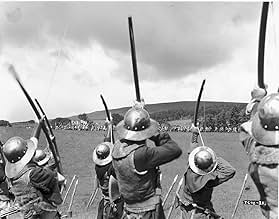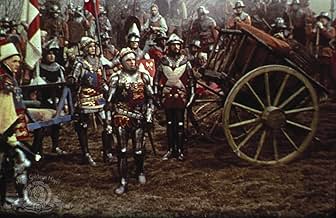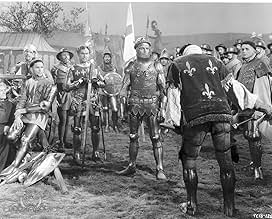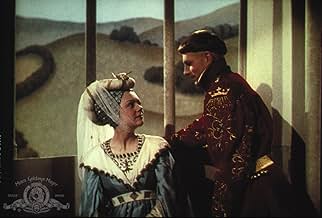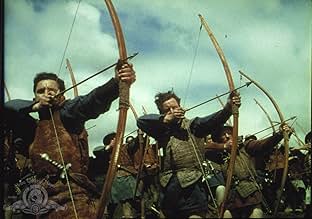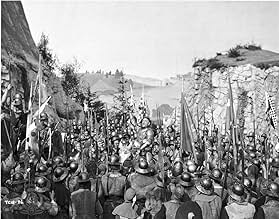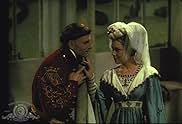Henrique 5º
O filme narra um período heroico na vida de Henrique V, rei da Inglaterra entre 1413 e 1422, que partiu em uma pequena expedição para reivindicar a coroa da França, onde foi recebido pelo ex... Ler tudoO filme narra um período heroico na vida de Henrique V, rei da Inglaterra entre 1413 e 1422, que partiu em uma pequena expedição para reivindicar a coroa da França, onde foi recebido pelo exército francês determinado a impedi-lo.O filme narra um período heroico na vida de Henrique V, rei da Inglaterra entre 1413 e 1422, que partiu em uma pequena expedição para reivindicar a coroa da França, onde foi recebido pelo exército francês determinado a impedi-lo.
- Direção
- Roteiristas
- Artistas
- Indicado a 4 Oscars
- 12 vitórias e 6 indicações no total
Avaliações em destaque
This is the first of three principal movies directed by Laurence Olivier along with ¨Hamlet¨ and ¨Richard III¨ based on Shakespeare plays . It's an astounding , stirring , stunning and thoughtful film with glimmer , glittering , colorful cinematography and splendid costume . Partly intended as a wartime morale-booster for the British . Certain parts of the play were consequently omitted , such as Henry's hanging of a friend as an example of firm justice . Laurence Olivier won a honorary and special Oscar for his producing , directing and acting in bringing English history part to vivid life of the screen made with pageantry and perfection . The excellent secondary cast is completed with usual players of the English stage theater and films with important careers : Leo Genn (Quo Vadis) , Leslie Banks (Jamaica inn) , Robert Newton (Treasure's island) , Ralph Truman (El Cid) , Felix Aylmer (Ivanhoe) , Ernest Thesiger (Bride of Frankestein) , Neal McGinnis (Jason and the Argonauts) , Freda Jackson (Brides of Dracula). The especial departments are outstanding , thus : Robert Furse in wardrobe and costumes , the classical musician William Walton and the photographer of superproductions Robert Krasker . Rating : Good and notable . Well worth seeing.
This play is a lot of fun, but it's very frustrating if you haven't read the earlier plays. There are so many poignant (or funny) moments that point backwards. Even the pretend audience at the beginning seems to feel that they want Falstaff back! The best acting moments in this movie are all scenes where the lower characters remember Falstaff and mourn his death.
Of course, there are some heroic battles and speeches in this movie, but looking back after forty years they don't seem as impressive as when I was 13. The great battle is actually over fairly quickly. And a lot of the later scenes drag, like when Captain Fluellen makes Pistol eat his leek. This is played as very bad slapstick when it's actually very violent and brutal in the play.
Whenever Henry V (to use the shorten title) comes on TV I always tape it simply because I always assume that it is a masterpiece of English cinema such is it's reputation in many circles. However this reputation may not be that well deserved as I have decided from my viewing of it today. The plot is Shakespeare and I will not criticise it, but I know myself that it is not a story that I would pick if asked to chose from his canon of work I prefer the darker stuff or the out and out comedies. That aside the film tells a straightforward tale, here used to raise morale and fly the flag of Britain and England during WWII. As such it works but I needed it to be more than just a flag waving exercise, I wanted more detail and more thought. Such scenes exist within the play but Olivier does not use them as well as he uses the grandstanding speeches and battle scene his focus is not on thought but on scale.
As director he does quite well in early stages and in the actual battle itself. The device of opening ad closing in the playhouse works to good effect and is clever but far too many scenes have poor camera angles or are poorly framed. The battle scene is good but too much of the film is ordinary in terms of looks and style. As actor Olivier carries the King well but is too one dimensional for me and I didn't have to put any thought into him to watch the film. He holds back for much of the film but leaps up for more upbeat scenes or rousing speeches. The support cast all sound natural with the dialogue although some of the roles are a little bit hammy, they still hold the film together well.
Overall this is an enjoyable film that has good spectacle to it and key scenes are very good. However the lack of anything under the surface is a problem and it is one of the lesser Shakespearean adaptations I have seen. Still worth a look but if you're like me, you'll be left wondering `was that it?'
And lest you're expecting a camera pointed at a stage, don't worry. Olivier, who produced and directed most of his Shakespeare films, has actually used the film medium to enlarge his plays' visual scope, while maintaining the intimacy that is the essence of live theatre. Also, Olivier is mindful of how daunting the language of Shakespeare is for modern audiences and has modified much of the original script to be more comprehensible, while preserving the feel of Elizabethan English.
Olivier's "Henry V" was to England what Eisentein's "Ivan the Terrible" was to Russia a familiar history rendered as a national epic, for morale purposes, while audiences were fighting off the Germans during World War II. There are other parallels. For example, both use static, formalized composition, in Henry V's case meant to resemble the images in medieval illuminated manuscripts and books of Hours. (In Ivan's case, according to Pauline Kael, like Japanese Kabuki.) Thus, a sound stage "exterior" backdrop becomes a tableau that serves to enhance, with its flat perspective and subjective scale, the view we have of that fabulous Age of Chivalry for which the play's Battle of Agincourt was the closing act.
I've always scoffed at the extravagant accolades which show business gives its own. But after seeing this film, or his equally brilliant "Hamlet," I can understand why Laurence Olivier was so good, that a knighthood wasn't enough, and so he was raised to the peerage.
Você sabia?
- CuriosidadesThe opening model shot of London was huge, 50 feet by 70 feet in size, and made of plaster. It took four months to construct.
- Erros de gravaçãoHenry V's reign was in the early 1400s, but most of the costuming in the film is from 1600, the time of the plays writing, almost 200 years later. The armor on the other hand is accurate. In fact, there is no anachronism in the costumes. The story is told from two points of view (one in the 1600s, as a performance in the Globe Theater; the other in the 1400s, as the characters originally lived). Costumes shift on purpose according to the point of view.
- Citações
King Henry V of England: Tell the Dauphin his jest will savor but of shallow wit, when thousands weep more than did laugh at it.
- Cenas durante ou pós-créditosThe main title not only gives the full title of the play as William Shakespeare wrote it, but spells the words in the 16th-century manner, not in modern spelling.
- Versões alternativasIn the American release of the film, all references to "bastards" in the dialogue were excised.
- ConexõesEdited into Robur, o Conquistador do Mundo (1961)
- Trilhas sonorasAgincourt Hymn (Deo gracias Anglia)
(uncredited)
Latin hymn text set to anonymous tune (1415)
Arranged by William Walton
Principais escolhas
- How long is Henry V?Fornecido pela Alexa
Detalhes
Bilheteria
- Orçamento
- £ 475.000 (estimativa)
- Faturamento bruto mundial
- US$ 62.619
- Tempo de duração2 horas 17 minutos
- Mixagem de som
- Proporção
- 1.37 : 1
Contribua para esta página




